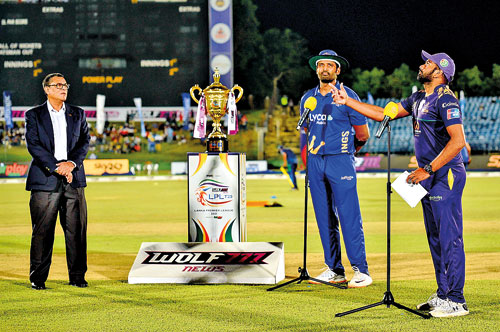Mixed concerns on ‘footballisation’ of cricket

The International Cricket Council does not believe international cricket faces an existential problem from overseas T20 franchise leagues luring top players away
There’s growing fear of cricket going football’s way with the sprouting of franchise-based T20 cricket leagues everywhere. Football is primarily club based, unlike cricket. National teams only play for the World Cup and other major tournaments like the European Championships, Copa America, Asia Cup and the Africa Cup of Nations.
There are some bilateral football friendlies now but the game is dominated by leagues like Premier League and the Spanish, Italian, German and Champions Leagues. Cricket seems to be heading in the same direction, with pools of domestic leagues mushrooming across the globe with Indian Premier League (IPL) remaining on top.
The International Cricket Council (ICC), however, does not believe international cricket faces an existential problem from overseas T20 franchise leagues luring top players away. Instead, they have found a way to co-exist, with leagues helping Boards to increase revenue and develop talent.
“What we have seen in the evolution of the game is that both international cricket and the domestic T20 leagues have found a way to co-exist,” said Wasim Khan, ICC’s General Manager of cricket in an exclusive email interview with the Sunday Times.
“What is important to note is that countries continue to maintain a balance between the leagues they run and their commitment to the international game,” he elaborated.

Wasim Khan, the ICC General Manager of cricket
“T20 leagues have provided opportunities for Boards to both increase revenues and develop talent; many of the incredible players that we now see flourishing in international cricket have come out of domestic T20 leagues. While some players over the last few years have decided to focus on the shorter format of the game through choice, the majority maintain a very strong ambition to represent their country in the longer formats”.
But in July, the Pakistan Cricket Board (PCB) had expressed concerns about the rising number of T20 leagues competing for space in the calendar and asked the International Cricket Council (ICC) to form a working group to evaluate the impact of franchise cricket on the international game.
This was after South Africa and United Arab Emirates announced the launch of two new T20 leagues, with owners of the IPL teams spreading their wings into other territories. All five franchises of the SA20 league are owned by the IPL teams while five of the six teams of the ILT20 are also Indian-held, including two IPL owners.
Kapil Dev, the Indian great, also believes cricket is heading the football way and that the ICC should try and see how they can ensure the survival of one-day and Test match cricket amidst the new global trend. There are others, though, who believe cricket should follow the path of football. Former Indian cricketer turned commentator and coach Ravi Shastri has said that teams should “cut down on those bilateral games and give time for the players to rest, recuperate and play Test cricket”.
“There is enough franchised cricket,” Shastri was quoted as saying last year.
“That is working. But what is the point of bilateral? In my seven years with this Indian team, I don’t remember one white-ball game. If you win a World Cup final, you will remember it and that’s the only thing left for me as a coach. Otherwise, you bloody cleaned up everything across the globe. I don’t remember a single white-ball game. Test matches? I remember every ball. Everything.”
The latest ICC’s Future Tours Programme (FTP) from May 2023 to April 2027, has granted a two-and-a-half month window for the IPL from late March to early June. In addition, the England and Wales Cricket Board (ECB) and Cricket Australia (CA) have also left windows for the Hundred and the BBL in their respective schedules. Sri Lanka, too, has reserved a window for its domestic league LPL in August/September while the two new leagues will be played in January starting from next year.
“Our members remain strong in their individual commitments to international cricket and this has been reflected through the increase in cricket across all three formats in the next cycle of the FTP from 2023,” asserted Mr. Khan, a former English first class cricketer. He added that Cricket Boards should take care of their players and their needs, just as they are keen in increasing their revenue streams.
“We are lucky to have three vibrant forms of the game with their own followers and fans”, he said.
“Many teams are now operating a rotation policy to support and manage player workloads, which is important and suggests that there is recognition from Cricket Boards that while increasing commercial revenues remains important from a sustainability perspective, taking care of the players and their needs is also a key priority”.
Despite the increase in the number of franchise-based leagues, there is an increase in the number of matches being played during the 2023-27 cycle. From 694 matches in the current FTP (2019-23), the 12 full members will play 777 international matches–173 Tests, 281 ODIs and 323 T20Is–in the next four-year period. This is without the ICC tournaments scheduled for each year.
Sri Lanka played only 25 Tests during the four years, an average of six per year.
“The ICC does not decide the amount of bilateral cricket each Member plays, nor the format. The process of finalising an FTP between members can take up to two years to complete and each country will make decisions of their format-mix based on their areas of focus, the desire of fans and broadcasters, and the availability of other countries to factor in a series at a given time in the calendar”, Mr Khan said.
He also pointed out that the World Test Championship has given context to the longer format and that members have shown a strong commitment to play Test cricket as well ODI bilateral cricket during the next cricket cycle.
“Expansion from a 10-team event in 2023 to 14-team World Cups in each of the 2027 and 2031 editions will ensure there is both continued context for this (ODI) format, and an increased opportunity for more Associate Members to progress to a 50-over World Cup,” he asserted.
However, the ‘footballisation’ of cricket seems inevitable with players even willing to give up their national contracts to join franchise teams which give them much freedom and more money. This would be real challenge facing the member boards like Sri Lanka, Pakistan and West Indies in the future and as PCB had suggested, the ICC should evaluate the current environment and find a way to support the co-existence of both international and franchise cricket.


